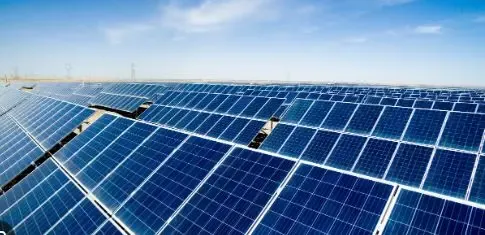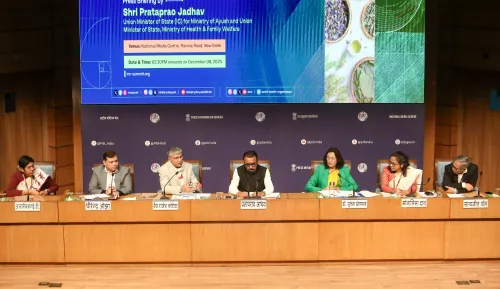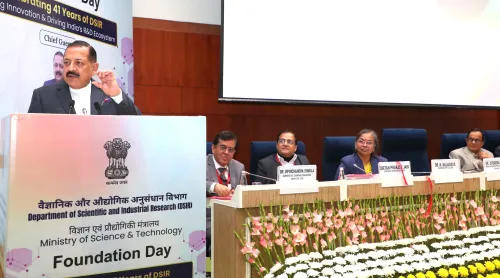India Achieves 100 GW Solar Power Capacity, Boosts Local Manufacturing

Synopsis
Key Takeaways
- India surpasses 100 GW of solar power capacity.
- Significant growth in solar manufacturing, reaching 60 GW.
- PM Surya Ghar Muft Bijli Yojana empowers households with rooftop solar energy.
- Record addition of 24.5 GW in 2024.
- Solar energy constitutes 47% of total renewable energy capacity.
New Delhi, Feb 7 (NationPress) Demonstrating the nation’s dedication to a sustainable future, India has achieved a remarkable milestone by exceeding 100 GW of installed solar power capacity, solidifying its role as a global frontrunner in renewable energy, as stated by the government on Friday.
As of January 31, India’s total installed solar capacity reached 100.33 GW, with 84.10 GW currently under development and an additional 47.49 GW in the tendering phase.
This extraordinary accomplishment is a crucial step toward achieving the ambitious goal of 500 GW of non-fossil fuel energy capacity by 2030, as outlined by Prime Minister Narendra Modi.
“India’s energy transformation over the past decade has been both historic and motivating. Programs such as solar panels, solar parks, and rooftop solar initiatives have led to groundbreaking changes,” remarked Pralhad Joshi, Union Minister of New and Renewable Energy.
“Today, India has met its target of 100 GW of solar energy capacity. In terms of green energy, India is achieving self-reliance and providing a new direction for the world,” he highlighted.
The PM Surya Ghar Muft Bijli Yojana is turning rooftop solar into a common reality, providing homes with clean energy and revolutionizing sustainable energy.
Launched in 2024, this initiative is approaching 9 lakh rooftop solar setups, allowing families nationwide to adopt eco-friendly energy solutions.
India’s solar power industry has experienced an astonishing 3,450% growth in capacity over the last decade, rising from 2.82 GW in 2014 to 100 GW in 2025.
Moreover, the nation’s hybrid and round-the-clock (RTC) renewable energy projects are progressing swiftly, with 64.67 GW under various stages of implementation and tendering, totaling 296.59 GW of solar and hybrid projects.
Solar energy is the leading contributor to India’s renewable energy expansion, accounting for 47% of the total installed renewable energy capacity.
According to the minister, a record 24.5 GW of solar capacity was added in 2024, marking a more than two-fold increase in solar installations compared to 2023.
Additionally, 18.5 GW of utility-scale solar capacity was installed last year, nearly 2.8 times more than in 2023. States like Rajasthan, Gujarat, Tamil Nadu, Maharashtra, and Madhya Pradesh have been key players in boosting India’s total utility-scale solar installations.
The rooftop solar sector also experienced impressive growth last year, with 4.59 GW of new capacity added, reflecting a 53% increase compared to 2023.
India has made significant advancements in solar manufacturing as well. From a modest solar module production capacity of just 2 GW in 2014, it has now soared to 60 GW in 2024, positioning India as a global leader in solar manufacturing.
“With ongoing policy support, India is set to attain a solar module production capacity of 100 GW by 2030,” the minister affirmed.










